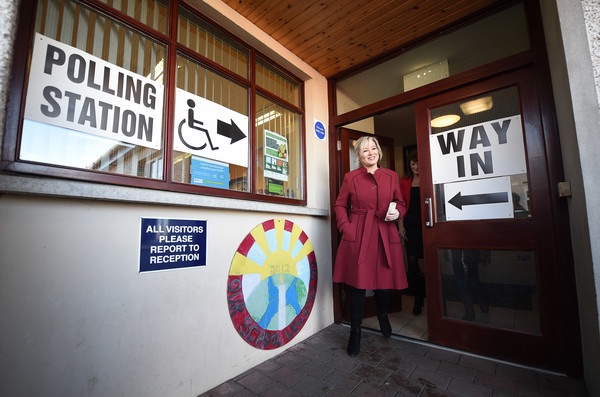
The polls have closed in the Six County Assembly election with voter participation reported to have substantially recovered from the record low voter turnout in last year’s Assembly election.
The first seats are due to be declared on Friday afternoon, with some counts expected to extend into Saturday.
The poll to the Stormont Assembly is the second in 10 months. It was called after Sinn Fein’s Martin McGuinness quit the position of Deputy First Minister in protest at the failure of DUP leader Arlene Foster to step aside ahead of an inquiry into alleged corruption.
There were dozens of reports of polling stations with substantially higher voter numbers than last year. While some appeared to have been influenced by the controversial culling of the voter register by the electoral authorities earlier this year, the general trend was up.
Turnout is understood to have ranged from over 80% in parts of Tyrone and Fermanagh, where voter participation is traditionally high, to below 50% in parts of Belfast, where bouts of heavy rain appear to have taken their toll.
Commentators have predicted overall turnout should reach 60%, a 6% increase on last year’s election and could reach up to the 63% reached in last year’s European referendum. The official turnout will not be known until the counting process gets under way on Friday.
Five Assembly seats are up for grabs in 18 constituencies, with the overall number returned falling from 108 to 90 as a consequence of the implementation of previously agreed reform measures.
Most interest in this election is focussed on the key level of 30 assembly members which the DUP must retain in order to hold on to their veto over political change under the 2006 St Andrews Agreement.
The Ulster Unionists and nationalist Social Democratic and Labour Party (SDLP), have presented themselves as an alternative cross-community partnership to the outgoing SF/DUP coalition. However, they did not field enough candidates to replace them.
Three weeks of talks have been set aside to allow attempts to restore power-sharing between Sinn Fein and the DUP. If the three-week post-election deadline passes, British Direct Ruler James Brokenshire is legally obliged to call yet another election.
However, in similar situations in the past, the British government has opted to unilaterally suspend the Assembly and reimpose full Direct Rule from London while negotiations continued.
One issue in the forthcoming talks is likely to be Sinn Fein’s call for the introduction of an Irish Language Act, which the DUP has vetoed and vowed to oppose.
While this can be resolved by the British government introducing an Act at Westminster during a period of Direct Rule, the biggest sticking point in the talks is still likely to be the position of Arlene Foster, who has vowed to return to office as First Minister regardless of Sinn Fein’s insistence that she appoint a replacement during the corruption inquiry, a process which could take up to a year.
Sinn Fein’s northern leader Michelle O’Neill, who has taken over the position vacated by Martin McGuinness, was upbeat as she filled out her ballot paper in her home village of Clonoe, County Tyrone.
“It’s great that so many people are coming out to vote,” she said. She thanked everyone who voted for Sinn Fein. “What Sinn Fein wins in this election will be a win for all and we will carry our mandate through to the post election negotiations,” she added.
![[Irish Republican News]](https://republican-news.org/graphics/title_gifs/rn.gif)
![[Irish Republican News]](https://republican-news.org/graphics/title_gifs/harp.gif)

